| |
Taken from Dissident Voice (February 21, 2003)
Chant Down Babylon!
Radical Artists Challenge Bush's War on the World
by Hans Bennett
Who here has heard of Paul Robeson?" Saul Williams asked. Few in the crowd of over 3,000 seemed to know. "If you haven't heard of him, there's a reason," Williams explained, arguing that activist artists like Robeson have been consciously erased from our nation's historical memory.
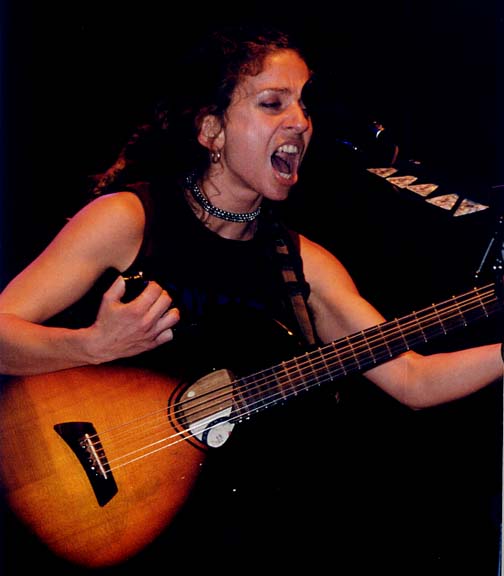
Ani Di Franco Rocks The House! |
At the January 31 "Not In Our Name" anti-war concert in Berkeley, artists like Williams, Chuck D & the Fine Arts Militia, Ani Di Franco, Ozomatli and Michael Franti & Spearhead helped keep Robeson's tradition alive. The performers, as well as concert organizers, used their platform to speak out against the upcoming war on Iraq, US imperialism, media censorship, domestic poverty, and a host of other critical issues. The concert itself was a benefit for AWOL Magazine, a Philadelphia-based hip-hop periodical published by the Central Committee for Conscientious Objectors. One of AWOL's main objectives is to counter the military's recruitment of youth of color, and each issue comes with a free CD featuring some of the best in today's revolutionary music.
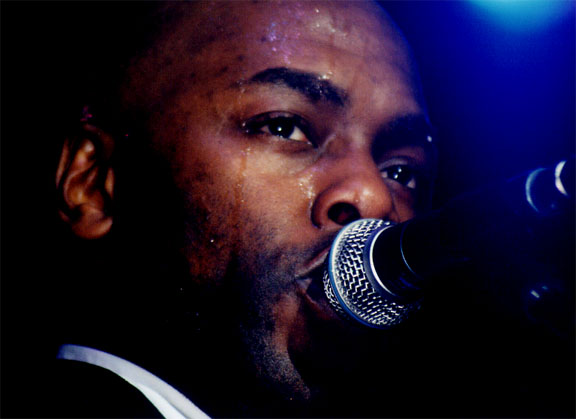
Brian Hardgroove of the Fine Arts Militia. |
The concert came at a pivotal moment, as the federal government sought international support for escalation of its ongoing war on Iraq. While Operation Desert Storm killed between 100,000 and 200,000 Iraqis, the subsequent sanctions and bombings have persisted as never-ending "low-intensity" warfare against the Iraqi people. Aerial bombings committed by the US and British militaries in the name of enforcing "No Fly Zones" that were never authorized by the UN and are therefore illegal have been killing people since the early 1990s. Still, these bombings have primarily had psychological effects. The real death and destruction have come in the form of economic sanctions. These sanctions have done nothing to loosen the Saddam Hussein's dictatorial control over the nation. What they have done is claim the lives of over 500,000 innocent children and over one million people overall, according to a 1996 UNICEF report. Sanctions make it difficult for most Iraqis to access nutritious food, clean water and adequate healthcare. These problems are exacerbated even further by radioactive depleted uranium (DU) dust left over from exploded US and British DU ammunition from the 1991 war.
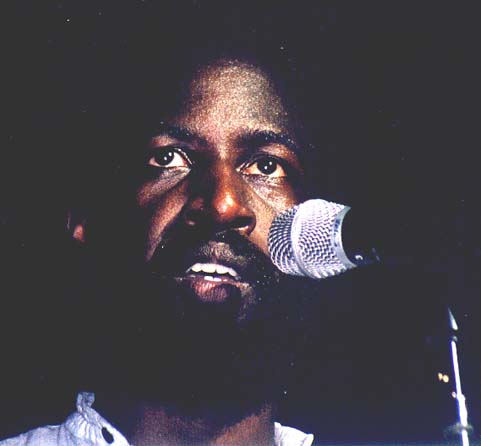
Saul Williams |
The "Not In Our Name" concerted proceeded with this background in mind. Chuck D & the Fine Arts Militia opened the event with the 1988 Public Enemy song "Black Steel In The Hour of Chaos." In the song, the singer is imprisoned after refusing to be drafted by the US military. He eventually escapes during an armed insurrection in which he shoots and kills a prison guard. The song begins, "I got a letter from the government the other day.it said they were suckers. They wanted me for their army or whatever.They could never understand that I'm a Black man and I could never be a veteran."
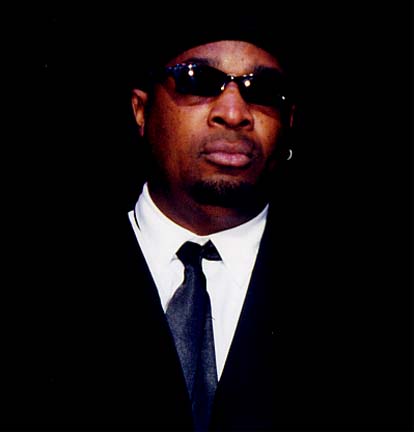
Chuck D performs with the Fine Arts Militia. |
Chuck then began reading poetry from his book to the sounds of Fine Art's Militia's hard core rock. In one piece, Chuck D repeated the line "Rebel Vs. Thug Vs. Rebel." as he castigated rap that glorifies gangsterism, something he argues is fundamentally counterrevolutionary.
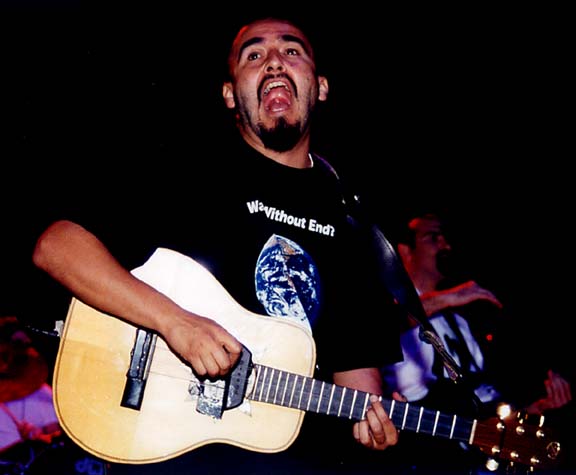
One of Ozomatli's many members. |
Throughout the concert there were many different speakers. Rutgers University Professor Jeremy Glick criticized US foreign policy and blamed it for the death of his father, who was killed in the September 11 World Trade Center tragedy. Further still, Glick passionately argued that George Bush and other leaders have used the death of his father and others to justify their wars of aggression beyond.
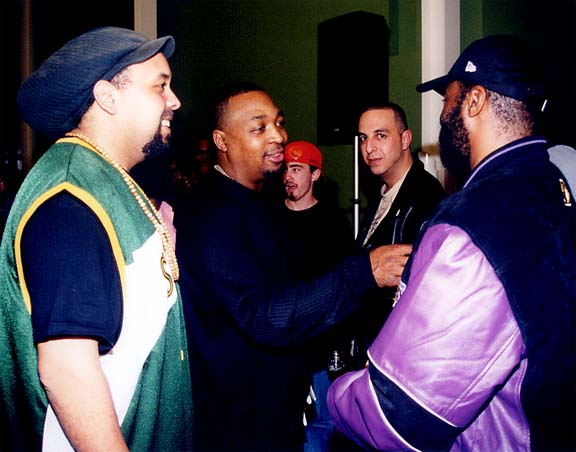
Chuck D speaks with crowd at UC-Santa Cruz after he gave a lecture on January 30, the day before the NION concert. Rutgers professor Jeremy Glick is in background. Mario Africa is on the left. |
Ozomatli, Ani Di Franco, Saul Williams, and Michael Franti & Spearhead followed with performances that blended political commentary with excellent music and poetry. The day was a testament to the powerful potential of performing artists to assist and work in conjunction with community organizing and political movements.
Ozomatli, Ani Di Franco, Saul Williams, and Michael Franti & Spearhead followed with performances that blended political commentary with excellent music and poetry. The day was a testament to the powerful potential of performing artists to assist and work in conjunction with community organizing and political movements.
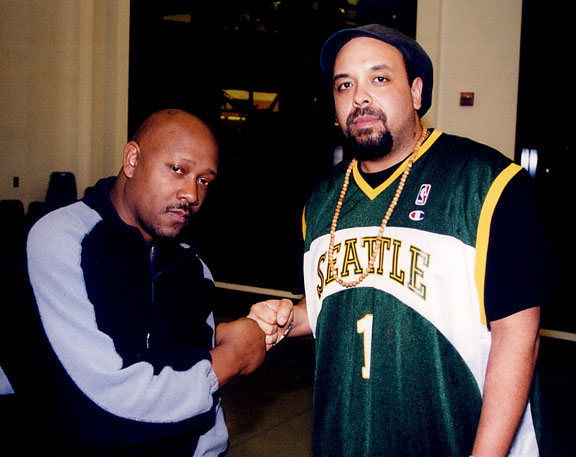
Mario Africa with Davey D of KPFA's "Hard Knock Radio." |
Artists who publicly challenge the policies of the powerful today still face similar obstacles to those of Robeson. In the mid-90s, world-famous pop star Sting publicly supported death-row political prisoner Mumia Abu-Jamal by signing an ad calling for a new trial and by appearing at public events for Abu-Jamal. When Sting's 2000 music tour came to Philadelphia, a national police organization refused to do security for the show and threatened to cause problems at future concerts. The day before the concert, Philadelphia's most prestigious newspaper printed an article about his support for Abu-Jamal. This article, along with Sting's photo, was interestingly enough featured on the obituary page. The next day's paper featured a long article in which Sting denied ever signing an ad on behalf of Abu-Jamal, saying that it must have been a mistake.
At the "Not In Our Name" event, artists not only performed on stage; they courageously spoke out against Bush's war drive during a pre-concert press conference. The various speakers briefly introduced themselves and explained why they felt a need to speak out.
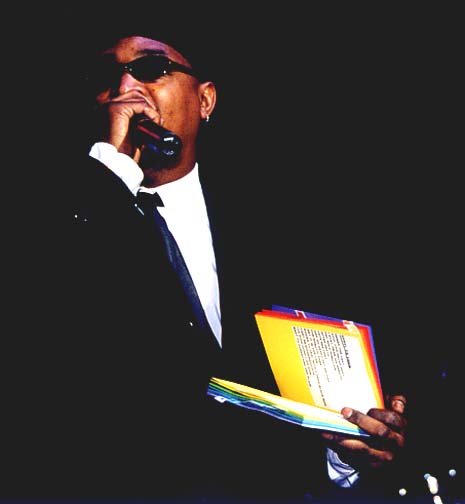
Chuck D read his poetry to the hard rock of the Fine Arts Militia. |
Michael Franti poignantly described his feelings of powerlessness since September 11 and how he is "scared about what's happening in the world." He said his performance that day was a way to "join with the community and say that we are not just opposed to this war, but also to militarism in general."
Mario Africa of AWOL magazine, as well as MOVE and the International Concerned Family and Friends of Mumia Abu-Jamal, quoted MOVE founder John Africa, as saying that "as long as you're committed to doing what's right, the power of righteousness will never betray you."
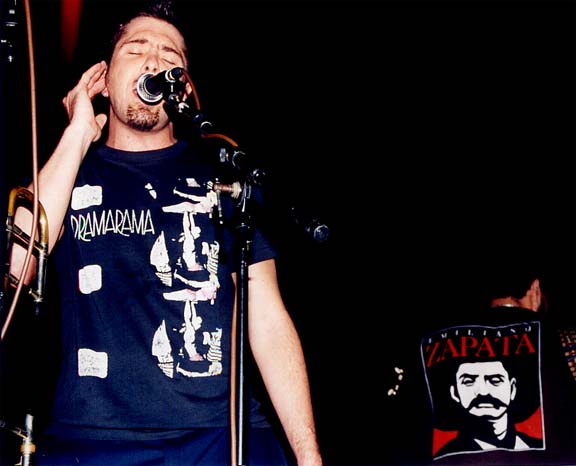
Saul Williams speaks at the pre-concert press conference on Jan. 31. |
"A lot of our family is being snatched away be military recruiters. They are being misled and tricked into joining the military and supporting war," Africa explained. He argued that people who suffer from poverty, particularly youth of color, are preyed upon by US military recruiters offering a way out. "They lure recruits from one culture of death to another. We have to stop what's happening in our communities. We have to stop the body snatchers."
Africa described the real motivations behind the imminent war on Iraq not as "fairness, equity, or protecting US citizens." He said, "This is a war of aggression. It's a global takeover. It's an addiction to oil that is afflicting the entire planet."
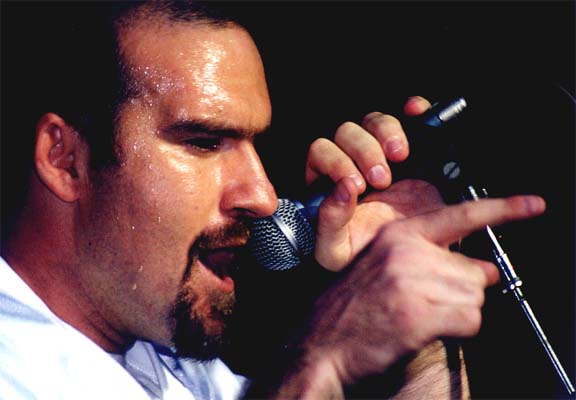
Member of Ozomatli |
When asked about the role that mainstream media plays in supporting the war drive, Saul Williams pointed to the fact that Secretary of State Colin Powell's son Michael is the head of the Federal Communications Commission. "There's a strong connection. Media conglomerates are large corporations," he explained.
Williams recalled watching CNN during the Rwandan genocide of the mid-90s. "I'll never forget CNN saying that 'thousands of people have died today in Rwanda' for 18 seconds. Then they had a one and a half minute feature on the Rwandan gorilla that is becoming extinct."
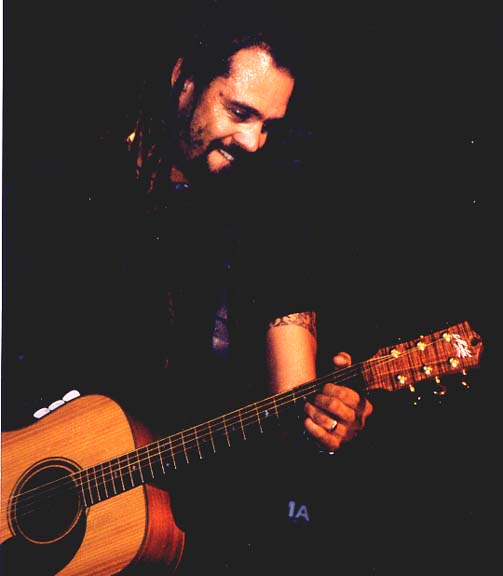 alt="Michael Franti">
alt="Michael Franti">
Michael Franti performs |
Ani Di Franco said that, "Even the facade of truth or objectivity in the mainstream media is gone. We can't look to the White House for political leadership. We can't turn on TV and see truth. We have to look to each other and become our own media."
Africa seemed to agree, saying, "If we think there needs to be people's radio, TV, music videos, and art, then we need to do it."
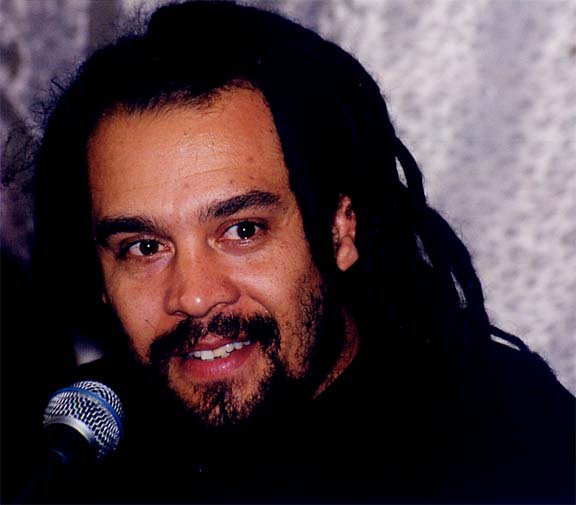
Franti speaks at the pre-concert press conference. |
The last questions of the day hinted at tactics for stopping the war and the issue of where the anti-war movement may be headed. Africa responded that people should be doing whatever it is they can best bring to the movement.
"In our movements for liberation we often see the 'this group won't work with that group because their ideologies are too different' behavior, which keeps us from being stronger. If we really want to bring this system down, we have to come at all levels," he explained.
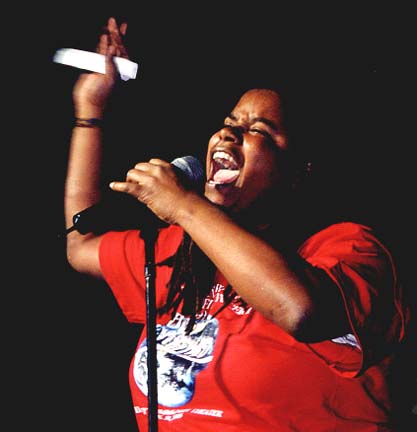
Representative of the Revolutionary Communist Party's |
As an example Africa discussed about the current debate over the issue of property destruction. He said that protesters not engaging in property destruction shouldn't have a problem with "comrades who want to throw something through the window of Starbucks.While I may not be doing that, I'm not going to fight with or discredit them. They are not the enemy. The enemy is the death culture that we see in front of us."
Williams ended the press conference on an uplifting note, pointing out that, "There are more people protesting now than before the Vietnam War... This is a reason for us to be inspired... We as a people are more powerful than any people in legislative positions."
|
|